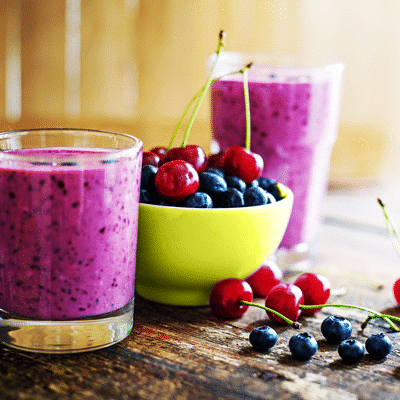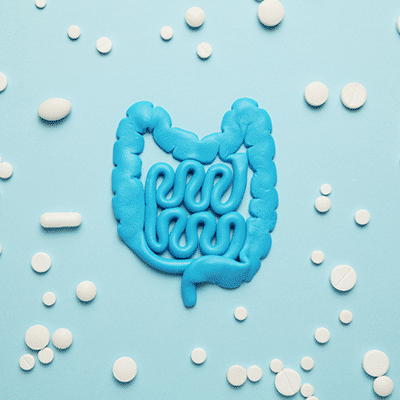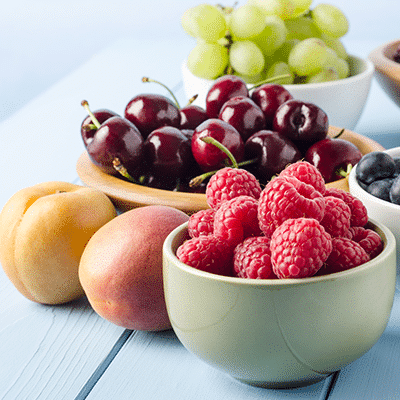Prebiotics and Polyphenols: The Connection

Eat your fruit.
Eat your veggies.
Eat your whole grains.
Eat your heart out (as long as it desires healthy foods).
We are constantly being told all of these things because they are healthy.
What makes them healthy though?
Most of these products are full of polyphenols.
While most of us know we should be eating them, we don’t really know why other than the fact that they’re “healthy”.
Is that really good enough?
Why are they healthy?
We have been told that they have antioxidant capabilities and that they fight free radicals that swim in our bodies.
However, there might be a lot more to it than that.
Recently, we have found out that not only do they help your body fight dangerous invaders and support our healthy workers, but now we know that they’re actually prebiotics too!
What?
You read that right.
Polyphenols aren’t just antioxidants or anticancer, they are prebiotics supporting your gut health too.
Polyphenols Not Necessarily Fiber
When we think of digestive support, we usually immediately think of fiber or probiotics.
It’s how we’ve been conditioned to be, just like Pavlov’s pups.
Products like Atrantil take a different route to support your gut health — and that route is prebiotics.
Prebiotics are essential for your gut health.
They don’t add extra bacteria to your gut like probiotics.
Prebiotics instead will pass through your small intestines and hang out in your large intestines to be fermented and processed.
The result of fermented prebiotics is crucial to good health.
The end-products are recirculated through your body and used for most everything your body does.
Fibrous foods used to be thought of as the only way to get prebiotics, but now we know that polyphenols themselves have these prebiotics effects on your gut and body health.
While the sources of polyphenols also contain fiber, even foods low in fiber and high in polyphenolic content have prebiotic effects in your gut.
Bioavailability vs Bioaccessibility of Polyphenols
The polyphenolic content of your foods varies greatly between food types and specific foods.
Each has its own unique makeup and availabilities of different polyphenols.
Polyphenols are broken down into the following groups:
- Phenolic Acids
- Flavonoids
- Lignans
- Stilbenes
Different foods are categorized into whichever group it contains the highest quantity of.
Bioavailability refers to how many polyphenols are in a particular food.
Bioaccessibility refers to how much of those polyphenols you are actually able to get/use from the food.
Skins, seeds, barks, and pits all contain some of the highest concentrations of polyphenols, but you can’t exactly go around eating all of those parts of plants.
Some ways to “level up” your polyphenol intake and get as much of those bioavailable goodies include:
- Extracts and oils allow us to utilize the polyphenols that are bioavailable but not exactly bioaccessible to us. By using the parts we normally toss in the compost bin, we are able to get extracts and oils to ramp up our polyphenol intake.
- Cooking can help to break down the cellular walls of foods. Not only will this help with digestion, but it also unlocks extra polyphenols that your body is able to absorb and use.
- Cooking with oils can help to bring out even more of the polyphenols your body craves. Cooking tomatoes in olive oil is a great representation of this phenomenon.
- Fermentation happens inside of your large intestines to get the most nutritional value out of your foods. While your body naturally does this, when certain foods are fermented ahead of time — like grapes for wine — you’re nudging that process along and giving your body more of those polyphenols you may not have gotten before.
Allowing your body to use the largest quantity of bioavailable polyphenols that weren’t originally bioaccessible helps to supercharge your gut and therefore your entire body.
How Polyphenols Affect Your Gut Health
Polyphenols affect your gut health by being prebiotics. But the how of all of this is actually really important.
We won’t break down every detail since you probably aren’t interested in the structure of each phenol, but there are some things you really need to know when using polyphenols as your source of prebiotics.
All Polyphenols Are Not Created Equal
Just like every fruit isn’t the same flavor, shape, texture, or size, neither are its nutritional properties.
This is why you should have a huge variety of polyphenol-filled foods in your diet.
Eating too much of one type can cause complications.
But if you eat a little bit of everything, you have nothing to worry about and so much to gain.
When it comes to your gut, you don’t want all of your polyphenols to be the same since each one benefits your gut in a different way.
Polyphenols Do Things Differently
While most things that affect your bacteria do one specific thing, polyphenols really steal the show and do it all.
Antibiotics fight all bacteria — good and bad.
Probiotics boost your bacterial count — but this isn’t always good for everyone.
Polyphenols are able to do both. Polyphenols have been found to stimulate growth of good bacteria while fighting pathogenic bacteria that shouldn’t be there.
Here are some study results to back all of that up:
- Flavonols found in cocoa increased Bifidobacterium and Lactobacillus species of bacteria while decreasing Clostridium strains.
- Tea has been found to increase Bifidobacterium species and decrease Clostridium and Bacteroides species.
Some other fruits that were found to significantly improve the bacterial balance of your gut include wild blueberry, cranberry seed, and red wine.
Atrantil For the Win
Creating a well balanced diet is crucial to your overall body health, which happens through your gut.
Eating a wide variety of different fruits, vegetables, and whole grains helps to keep your gut and body in check.
Since polyphenol rich foods also support your gut through their prebiotic capabilities eating foods that contain them is necessary to maintain good health.
Atrantil is the best of all the worlds.
Atrantil gives you a dose of prebiotics through the ingredients that are also jam-packed with polyphenols.
Boosting good bacteria, fighting bad bacteria and creating a healthy body through gut modulation is what Atrantil can do for you.
So what are you waiting for?
Go get your daily dose of goodness (AKA Atrantil) and help heal your body to victory!

